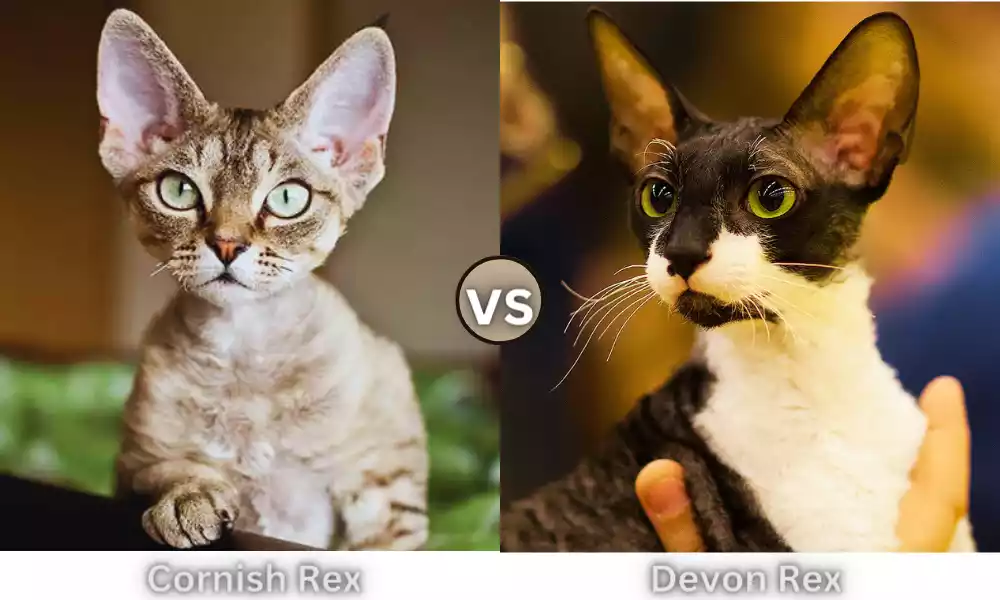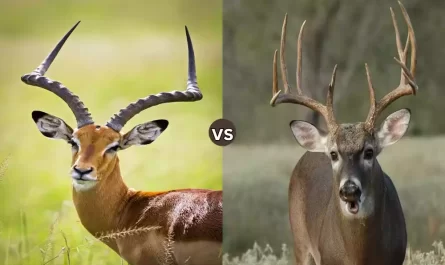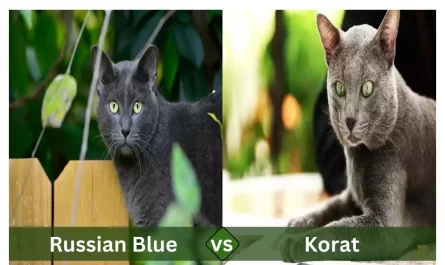Devon Rex and Cornish Rex are two distinct cat breeds that are known for their unique appearances and charming personalities. They may share certain similarities, like their curly hair, but they also have distinct traits that make them different. This guide will help you understand the differences between the two breeds and which would be the best cat companion for you.
Brief overview of Devon Rex cats
Devon Rex Cats are known for their friendly personalities and unique appearance.
Coat: Devon Rex Cats have a curly, short, and soft coat. This sets them apart. The lack of an underlayer makes their coat exceptionally fine, and less likely to shed than other cat breeds.
Appearance: They are characterized by large, expressive, cheekbones and large ears. This gives them an elf-like appearance. They often have a mischievous, endearing look on their faces.
Body: The body of the Devon cat is slender and athletic with strong legs. They have a graceful, yet robust build.
Personality: Devon Rex Cats are known for their playful and affectionate nature. They are very sociable and love to be with their family. Devons are sometimes called “people cats because they love attention and enjoy participating in family activities.
Intelligence: They’re known for their intelligence, curiosity, and flair for interactive play. Devons love puzzles and mental stimulation.
Maintenance: Devon Rex cats require relatively little grooming, despite their unique coat. A damp cloth or occasional brushing can keep the coat in good shape. The cats are healthy but their fine fur may need extra protection against cold temperatures.
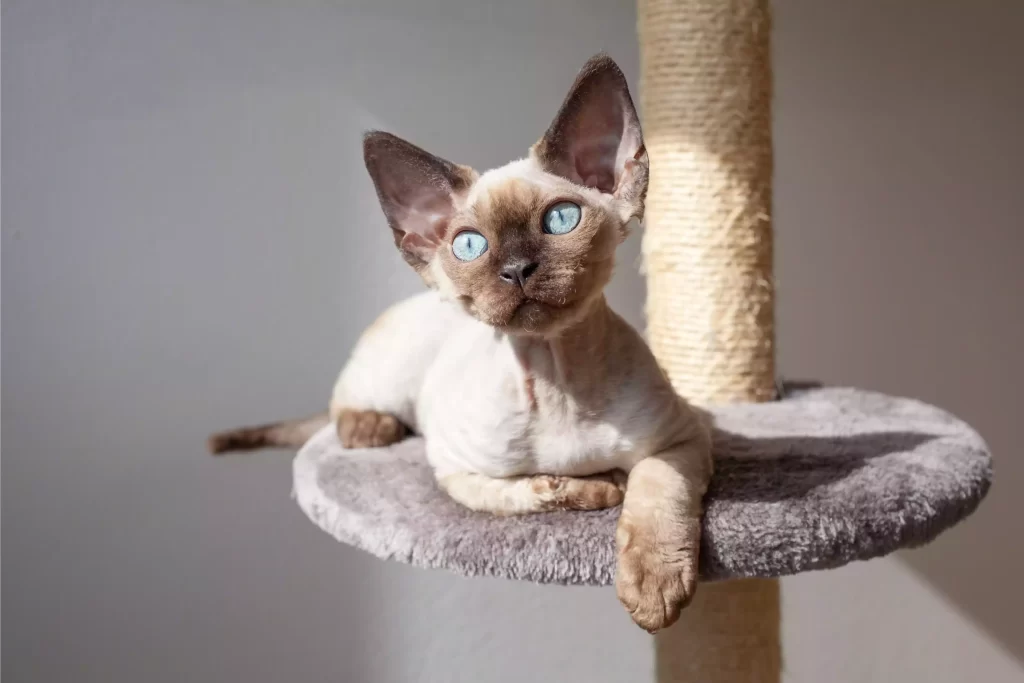
Devon Rex cats are a great companion for those who can give them the attention and stimulation that they need. They are loved by cat lovers all over the world for their playful and affectionate nature.
A brief overview of Cornish Rex cats
Cornish Rex Cats are distinguished and elegant cats known for their unique looks and personalities.
Coat: Cornish Rex Cats have a very short, curly, and soft coat. It is also lacking the traditional outer guard hairs. They have a silky and sleek appearance.
Appearance: They are characterized by a distinct egg-shaped face with large ears and high cheekbones. The almond-shaped, expressive eyes of these dogs are large and bright. Their appearance is elegant and delicate.
Body: Cornish Rex Cats are small-to-medium-sized cats with long, slender limbs and an agile, svelte build. They are graceful and athletic.
Personality: Cornish Rex Cats are known for being playful, active, and affectionate. They are very social and love to interact with their humans. They are often the center of attention in the house and enjoy being there.
Intelligence: These cats have a natural curiosity and intelligence, and enjoy exploring and playing. They are quick to learn tricks and love interactive toys and puzzles.
Maintenance: Cornish Rex cats, despite their low-shedding coats, may require extra care in order to keep warm and protect themselves from the sun because of their lack of guard hairs. It is recommended to bathe regularly in order to remove any excess oil. They are healthy cats despite their unusual coat.
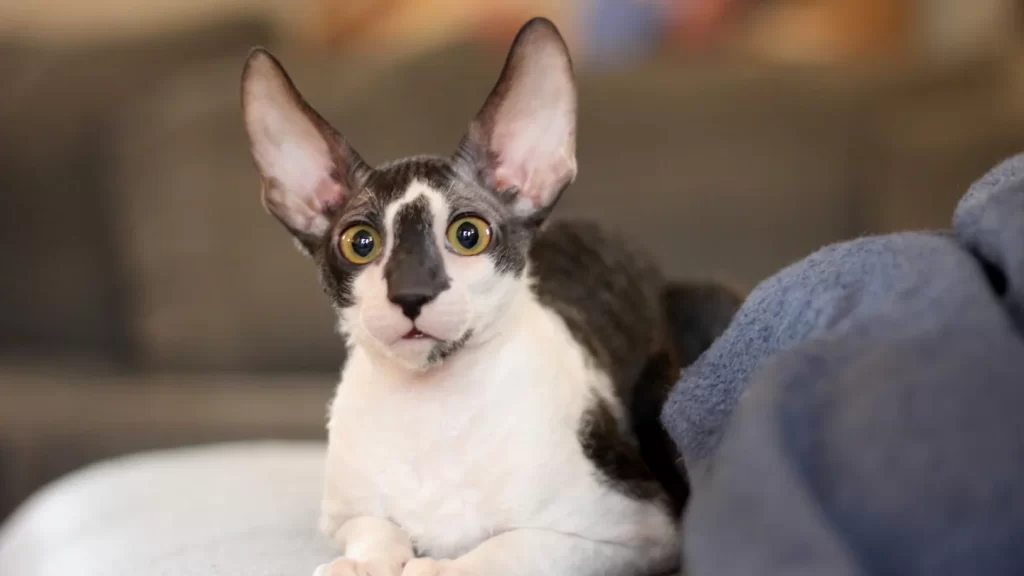
Cornish Rex Cats are loved for their lively personalities and striking appearance. They make a wonderful choice for individuals and families who can give them the attention, affection, and mental stimulation that they need.
Devon Rex and Cornish Rex Rex the table of comparison
Here’s a concise table comparing key characteristics of Devon Rex and Cornish Rex cats:
| Characteristic | Devon Rex | Cornish Rex |
|---|---|---|
| Coat Texture | Short, wavy, soft | Short, curly, fine |
| Coat Maintenance | Low maintenance | Requires more attention |
| Body Structure | Medium-sized, muscular | Small to medium, slender |
| Temperament | Playful, affectionate | Playful, highly affectionate |
| Activity Level | Active | Very active |
| Intelligence | Intelligent and curious | Intelligent and inquisitive |
| Sociability | Social and friendly | Extremely social |
| Grooming Needs | Minimal grooming needed | Regular grooming required |
| Allergen Tolerance | Tolerable for some | Tolerable for some |
| Health Considerations | Genetic predispositions | Genetic predispositions |
Remember that individual cats may vary within these general characteristics, so it’s essential to spend time with a specific cat to determine if their personality and care requirements align with your preferences and lifestyle.
Why understanding the differences between these breeds is important for potential cat owners
There are several reasons why it is important for cat owners to understand the differences between breeds of cats, such as Devon Rex or Cornish Rex:
- Compatibility: Different breeds of cats have different personality traits, energy levels, and care needs. Understanding these differences will help you choose a cat breed that fits your lifestyle and ensures a good match between you, your pet, and the animal.
- Allergies: Some people may be allergic to cat dander, but they find that certain breeds like Devon Rex or Cornish Rex are more tolerable because of their low-shedding coats. This information can help allergy sufferers choose a breed with fewer allergens.
- Grooming commitment: Cats of different coat types need varying levels of grooming and care. Knowing these needs will help you to prepare for the effort and time required to maintain your cat’s fur.
- Health Concerns: Breeds can have genetic predispositions for certain health problems. Knowing these risks will help you monitor your cat’s well-being and seek veterinary treatment if necessary.
- Temperament and Behavior: Different cat breeds have different behavioral characteristics. You can choose a cat with personality traits that match your preferences for playfulness, energy, and affection.
- Living Environment: The size of your apartment or home, as well as other factors, can influence the suitability of certain breeds. Some cats thrive in smaller homes, while others are more suited for larger ones.
- Compatibility with Lifestyle: Your everyday routine, such as your work hours and leisure time, may influence the cat breed you choose. Understanding the breed’s sociality and activity level can ensure harmonious coexistence between you and your pet.
- Long-Term Commitment: Adopting cats is a commitment that will last for a very long time since they can live up to 15 years. Selecting the right breed will ensure that your relationship with your cat is long-lasting and fulfilling.
It is important for cat owners to understand the differences in cat breeds. This allows them to make an informed choice that takes into account their preferences, lifestyle, and the ability of the cat breeds. You and your cat will both live a healthier and happier life.
Background Information
Background info about Devon Rex or Cornish Rex cat breeds can help you better understand their origins and evolution:
Devon Rex:
- Origins: The Devon Rex originated in Devonshire England in the early 1960s. It is thought to be the result of a genetic mutation that occurred in a feral feline population.
- Development: Breeders selectively selected and developed the breed’s wavy coat and large ears. They also developed expressive eyes. Breeders crossed Devon Rex’s original breed with other breeds such as Burmese and Siamese to create the breed.
- Recognition: Since the 1960s, cat associations have recognized and praised the Devon Rex breed for its friendly and playful nature.
Cornish Rex:
- Origins: Cornish Rex Cats hail from Cornwall in England where a kitten was born with a curly coat in 1950. This kitten named Kallibunker is considered to be the originator of the Cornish Rex.
- Breeding: The breed’s unique coat texture was the focus of selective breeding. In the beginning, Siamese or Burmese cats are used to develop the distinctive traits of this breed.
- Recognition: In the 1960s, The Cornish Rex became popular for its elegance and charming personality. The breed is now highly regarded by cat lovers around the world.
The Devon Rex and Cornish Rex breeds both have fascinating histories. They were created by genetic mutations, which led to their distinct coats and striking looks. Breeders developed and refined the breeds over time to produce the unique cats we love today.
Physical Characteristics
The physical characteristics of Devon Rex or Cornish Rex cats are distinct in their appearances. Take a look at each breed’s physical characteristics in detail.
Devon Rex:
- Coat Appearance and Texture: The Devon Rex’s most distinctive feature is its soft, short, wavy coat. The coat is composed of very fine down hairs or vellus hairs. This gives the coat a velvety texture. The coat is close to the body and does not have the usual guard hairs that are found in other breeds.
- Colors and Patterns: Devon Rex Cats come in many different colors and patterns. These include solid colors, bi-colors, and tabby patterns. You can find them in a variety of colors and combinations.
- Head: Devons are characterized by a head that is flat, with high cheekbones and a Roman-shaped nose. Their large ears sit low on their sides, and they have large and expressive eyes.
- Body: The body is muscular and medium-sized with a well-rounded chest. They also have a slim abdomen. Their legs are long and strong.
- Tail: A Devon Rex’s tail is medium-length, tapering into a fine tip.
Cornish Rex:
- Appearance and Coat Texture: Cornish Rex Cats also have short hair, but they are even curlier and softer than Devons. Their fur is very fine, and they lack the guard hairs that are typical of most cats. This gives them a velvety and sleek appearance.
- Colors and Patterns: Cornish Rex cat coat colors and patterns are similar to those of Devon Rex cats. The cats can display solid colors, bicolors, or various tabby patterns.
- Head: Cornish Rex Cats have a unique head shape, which is often described as being egg-shaped. The Cornish Rex cat has high cheekbones and a straight, large nose. Its ears are set high up on the head. Their almond-shaped eyes are expressive.
- Body: These cats are small or medium-sized with long, thin legs and a lithe, slim body. The arched back gives them a distinct and elegant appearance.
- Tail: A Cornish Rex’s tail is long, slender and elegant. It matches the body’s overall elegance.
The curly, velvety fur and distinctive facial features of both breeds set them apart from other cat species. Their unique head shapes, large ears, and expressive eyes add to their appeal.
Temperament and Behavior
Devon Rex and Cornish Rex cats may share certain personality traits because of their genetic connection, but they also display unique behavioral characteristics. This article will give you an overview of their temperaments and behaviors.
Devon Rex:
- Playful & Energetic: Devons have a boundless amount of energy and a love for playing. The playful nature of these cats is often referred to as a perpetual kitten.
- Social and friendly: These felines are very social and love being around people. They are affectionate and often seek attention from their family members.
- Curios and intelligent: Devons has a sharp mind. They love interactive toys, games, and puzzles that test their intelligence.
- Adventurers: They are curious about their surroundings and have an adventurous spirit. They are curious and like to explore every corner of their environment.
- Doglike Behavior: Devon Rex Cats are often referred to by their fondness for toys that they can fetch and their willingness to learn tricks.
- Tolerance with Other Pets: They are generally tolerant of other pets, including cats and dogs.
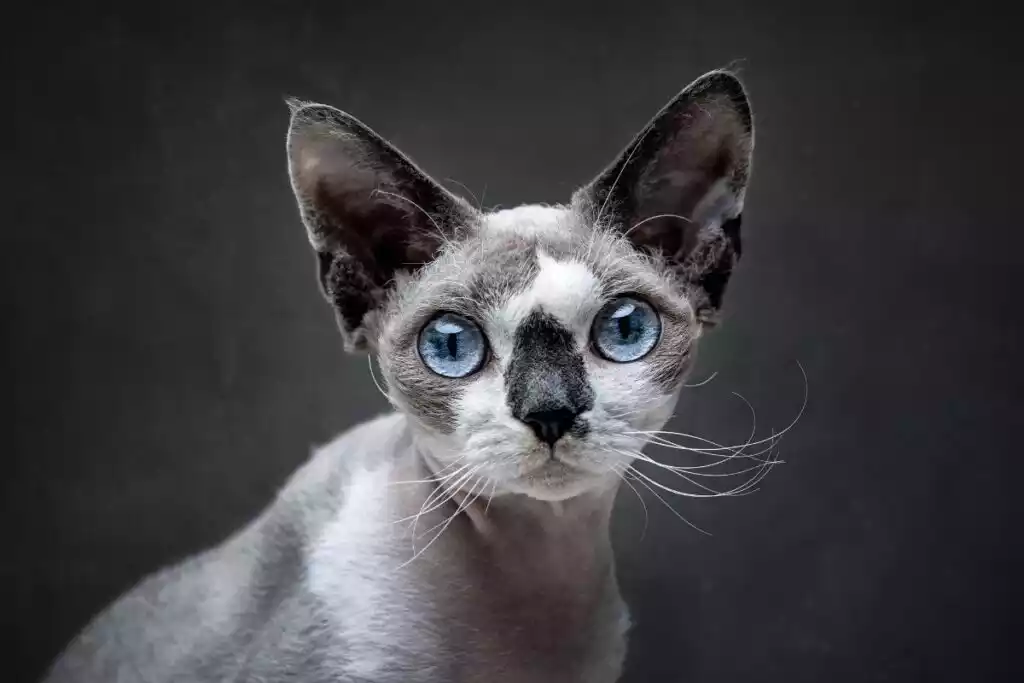
Cornish Rex:
- Active and Playful: Cornish Rex Cats are very active and playful. They love high-energy games and interactive toys.
- People-Oriented and Affectionate: This cat is extremely affectionate and loves to be the center of attention. They form strong bonds and thrive off affection and physical touch with their humans.
- Social and outgoing: Cornish Rex cats are social and outgoing cats. It is likely that they will welcome guests and participate in family activities.
- Inquisitive and Intelligent: They are intelligent and known for their curiosity. They will explore your entire home, and they’ll often find out how to open cabinets or doors.
- Vocal: Some Cornish Rex cats can be vocal and engage in conversation with their owners.
- Tolerant of Other Pets: Cornish Rex Cats are generally good with other pets.
Both breeds have a friendly and affectionate temperament, which makes them great choices for individuals and families who are looking for a cat to enjoy interactive play and close company. They are also entertaining and engaging pets due to their intelligence and curiosity.
Grooming and Maintenance
The unique texture of the coats of Devon Rex and Cornish Rex cat breeds influences their grooming and maintenance needs. The following is a breakdown of the maintenance and grooming requirements for each breed.
Devon Rex:
- Coat Care: Devons are known for their short, soft, wavy coat. It is low maintenance. They do not shed as much fur as other breeds that have longer hair. You can maintain the luster of their coat by brushing them with a damp towel or soft bristle brushes.
- Bathing: Although not necessary frequently, some owners give their Devon Rex kittens occasional baths in order to keep their coats and skin clean. Use a gentle shampoo for cats and rinse thoroughly.
- Eye Cleaner: Devons are more likely to stain their eyes due to the prominence of their eyes. Wiping their eyes regularly with a moist cloth will help to prevent staining.
- Ear Cleaning: Due to their large ears, Devons can also accumulate earwax faster than other cats. To prevent ear infections, it is important to clean your ears regularly. Use a veterinarian-recommended ear-cleaning solution.
- Nail trimming: Devons, like all cats, require regular nail trimming to prevent their nails from growing too long. This can cause discomfort or injury.
- Dental Care: Dental hygiene for cats of all breeds is important. Regular brushing, dental toys or treats, and regular dental examinations by the veterinarian can all help to maintain your cat’s oral health.
Cornish Rex:
- Coat Care: Cornish Rex Cats have a fine, short, and curly coat. They also shed very little. To keep their coats clean and free from loose hair, use a soft bristle comb or damp cloth. They may need to bathe more often to maintain their soft texture and remove excess oil.
- Bathing: Cornish Rex Cats may require more frequent baths because of their fine and oily coat. Bathing regularly can prevent the fur from matting and becoming greasy. Use a mild cat shampoo, and rinse thoroughly.
- Eye-and-Ear Cleaning: Cornish Rex Cats may require regular eye and ear cleansing to prevent staining or ear problems.
- Nail trimming: Regularly trimming the nails of all cats is important, even for Cornish Rex. This will keep their claws in a comfortable position.
- Dental Hygiene is important for Cornish Rex Cats as well. Dental treats and regular dental checkups can help to maintain their oral hygiene.
Cornish Rex cats require slightly more grooming to maintain their fur in optimum condition. Regular grooming is essential to your cat’s overall health.
Health Considerations
Like all cat breeds Devon Rex and Cornish Rex can be susceptible to certain health problems. Cat owners should be aware of the potential health issues and take measures to protect their cats. These are some health concerns that both breeds share:
Devon Rex:
- Respiratory Issues: Devon Rex cats with their short, fine coats may be more prone to allergies and respiratory infections. Keep your environment free of dust and allergens.
- Skin Conditions: The delicate skin of these animals can be susceptible to skin conditions such as rashes and fungal infections.
- Genetic Conditions: Although not exclusive to Devons, Devons can inherit certain genetic conditions like hypertrophic cardiomyopathy or patellar deluxation. Responsible breeding can reduce the risk.
- Dental Health: Cats are prone to dental problems. For their oral health, regular dental care is important, including professional cleanings and brushing.
Cornish Rex:
- Respiratory Issues: Due to their fine coats, Cornish Rex Cats may be more susceptible than Devon Rex to allergies and respiratory infections.
- Gastrointestinal Sense: Certain Cornish Rex Cats have sensitive stomachs, and are prone to digestive problems. This can be managed by paying attention to the diet and feeding schedule.
- Skin and Coat issues: Cornish Rex cats’ unique coat requires regular maintenance in order to prevent skin conditions and matting. They are also more susceptible than other cats to sunburn. Therefore, they need to be shielded from too much sunlight.
- Genetic Conditions: Cornish Rex kittens may inherit genetic conditions like hip dysplasia and certain heart conditions. Responsible breeding can reduce these risks.
- Dental Care: Dental health is also important for Cornish Rex Cats. For maintaining good oral health, regular brushing and dental examinations are important.
No matter the breed, it is important to have regular veterinary checks, vaccinations, and preventive care in order to detect and manage any health problems early. To provide the best care possible for their feline friends, cat owners must also be aware of breed-related concerns and their specific needs.
Choosing the Right Breed for You
When choosing a breed of cat, you should consider your lifestyle, your preferences, and the kind of pet that you would like to have in your home.
Consider the following factors when choosing between Devon Rex and Cornish Rex cat breeds:
1. Personality and Temperament:
- Are you looking for a playful and affectionate cat? Both breeds have friendly, sociable personalities. However, Devon Rex cats tend to be more dog-like, whereas Cornish Rex are affectionate, and are people-oriented. You should consider which temperament best suits your lifestyle, and how much interaction you want.
2. Grooming needs:
- Are you ready for the grooming needs of each breed type? Devon Rex cats are low maintenance and only require occasional wiping or brushing. Cornish Rex cat’s fine curly hair may need more frequent baths.
3. Coat allergies:
- Are you allergic to cat dander or does anyone else in your family? Although no cat breed is completely hypoallergenic for everyone, some people find the Devon Rex and Cornish Rex breeds to be more tolerable because of their unique coats and low-shedding nature.
4. Activity Level:
- Take into consideration your level of activity and how much time you have to spend with the cat. Both breeds are playful and active, but Cornish Rex cats are more energetic.
5. Space and Housing:
- Evaluate your living situation. Consider your living situation. Both breeds are adaptable to apartment life, but you should consider the amount of space and whether or not an active cat will be able to thrive in it.
6. Maintenance Commitment:
- Consider how much time and energy you are willing to spend on grooming, health care, and general cat care. Cornish Rex catcats may need more care than Devon Rex.
7. Personal Preferences:
- In the end, it’s your preferences that matter. Visit breeders and shelters to observe the behavior of cats to determine which breed you prefer.
8. Health Considerations:
- Consider the potential health concerns associated with each breed. Be prepared for regular veterinary care and understand the breed-specific health risks.
Remember that individual cats within a breed can have unique personalities, so it’s essential to spend time with the specific cat you plan to adopt to ensure a good match. Ultimately, choosing between Devon Rex and Cornish Rex cats should be based on your lifestyle, preferences, and the kind of companionship you desire from your feline friend.
The conclusion of the article
The choice between a Devon Rex or a Cornish Rex depends on your lifestyle, preferences, and grooming abilities. Both breeds have unique personalities, low-shedding coats, and affectionate temperaments.
However, they are different in their activity level and grooming requirements. To ensure a harmonious and happy relationship with your feline companion, make an informed choice based on the circumstances of your life.

